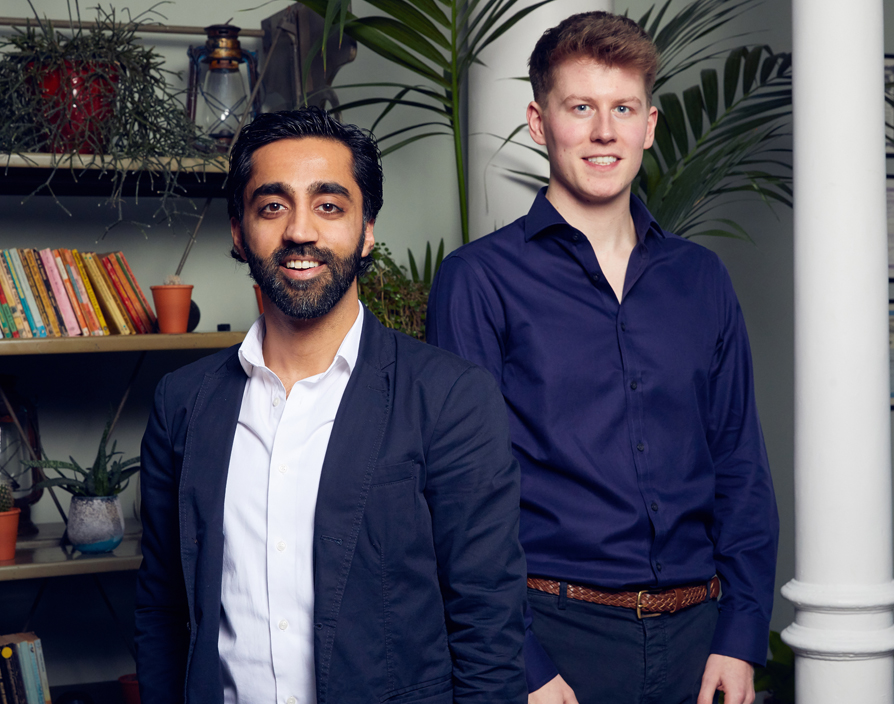muzmatch’s co-founders Shahzad Younas and Ryan Brodie. Photo credit: muzmatch
Whatever you do, don’t call muzmatch a dating app. And definitely not in front of Shahzad Younas, the co-founder and CEO of the startup. “Put simply, Muslims don’t date, they get married,” he says. Because of that, Younas hates it when the platform gets jumbled together with more mainstream hook-up apps like Tinder, Grindr or Bumble. “Many western apps are very casual but we’re a very serious app,” Younas says. “We’re connecting people for the purpose of serious relationships.”
The idea to create an app for Muslims uninterested in casual flings came to him because other platforms failed to generate the kind of serious relationships many Muslims look for. “Existing online websites generally had a terrible reputation,” he says. Not only were his friends in the Muslim community interested in a potential partners’ looks and personality but things like cultural background and religious compatibility also played a huge role. “So I constantly heard how difficult it was to find someone,” he says.
Recognising the potential of this untapped market, he quit his job as a banker, took £50,000 of his savings and built the first version of the platform. “I learned how to do apps and [created] the MVP (minimum viable product), so the very first version of the app,” he says.
However, having this version in place was only half the battle. The other was to prove the viability of his vision. “The hardest thing in the world is starting from zero and trying to get the first 100 people on it,” Younas explains. “It was a bit of a battle for them because why should they be on this app when nobody else was on it?” But that didn’t stop him. Instead he doubled down on his efforts and took to the streets of London to spread the word about the startup. “I would print flyers, go to the mosque for Friday prayers and after that hand them out there,” he remembers. “Anywhere and everywhere I could talk about muzmatch I would. Even down to the point where I would bring flyers down and stick them to the cars outside of the mosque to make sure they heard about it.”
Although, just because people knew about it didn’t mean they were convinced to join the community. “Initially, people didn’t really understand it,” he recalls. “This was in 2015 and at the time there were literally no apps for the Muslim market.” Of course, that doesn’t mean there were no dating services around at the time but apps were still rather new. Tinder had only launched in 2012 and niche romantic services like muzmatch, happn and Bristlr, the dating app for people who love men with beards, were still some way off in the future. And the people who knew about tech-based dating felt it was more about hook-ups than creating serious relationships. So for Younas, the key challenge was to convince his target audience his company was different from the rest. “The heart of the app is for Muslims to find a partner and nothing casual,” he says. “A serious relationship, that is what muzmatch is for. It’s not a hook-up app. That’s the key distinction. It’s something that we’ve maintained from day one. And we always will.”
The founder also recognised many in the Muslim community would be apprehensive about using the app, let alone telling their friends they’d used it. “They feel there’s an element of taboo,” Younas explains. “It’s definitely changing but it’s still present.” That’s why he’s taken his users’ privacy and safety extremely seriously from day one. “You can have your photos hidden,” he says. “You can use an anonymous nickname if you don’t want to use your real name.” Younas argues that a fortunate side-effect of this, combined with the bigger space muzmatch allows for its users profiles, is that people on platform are judged more for who they are rather than their appearance.
Fortunately, his extensive leafletting around London and patience slowly showed results when muzmatch began to gain traction. Within the first year, the community grew to over 50,000 users and in April 2016 Younas hired Ryan Brodie as muzmatch’s CTO and as his co-founder to help leverage the growing demand for the services.
While they’d already experienced some amazing results, the muzmatch leadership wasn’t ready for the big times just yet. This became abundantly clear at the end of 2016 when they applied to join Y Combinator, the legendary American seed accelerator that has helped companies like Reddit, Airbnb and Dropbox become immensely successful brands. Surprisingly for Younas, rather than welcoming the platform with open arms, the accelerator told them that they didn’t have enough revenue yet. “That was a bit of a wake-up call for us,” he admits. Instead of calling it a day, the team worked even harder, grew its revenue streams and as a result muzmatch was accepted into Y Combinator’s April 2017 batch. “I was thrilled,” Younas recalls.
Joining Y Combinator meant they were able to tap into the vast experience of the people running it and dare to think bigger than they previously had. “It was great to be in that culture,” says Brodie. “They had a real go big or go home [culture]. No one in America is impressed by a company hitting seven figures. That’s nothing to them. In the UK it’s all ‘well-done.’ So for while we were all very ambitious, they made us set the bar even higher and they have a great track record and all the tools you need to succeed. We couldn’t recommend them more highly.”
Just months later, they raised a $1.8m seed round in July 2017, which helped the startup grow to having over half a million users in 190 countries today. Indeed, muzmatch can boast having brought 15,000 couples together, many of whom have gotten married as a result of finding each other on the app. “We literally get photos from Africa, Asia and South America,” Younas smiles. “To see the global success of muzmatch is actually pretty mind-boggling.”
But being successful doesn’t come without its own challenges. One of which is that other Muslim dating apps like Minder and Muslima tried to steal some of muzmatch’s hard-earned market shares. “[Apps] like Minder and others have basically, at the heart of it, ripped us off,” Younas claims. “They’ve cloned parts of our design, even down to the text we use on the actual app store. So be it. You are always going to have people copy [you] and you can’t really prevent that. For us, our goal is to focus on what we are doing and make sure we’re the best because the best product will ultimately win.”
So what’s next for muzmatch? “We won’t stop,” Younas promises. “Our goal is to be the biggest Muslim marriage app around the world.” And there are signs that he may get exactly what he’s asking for. Having originally only been available in English, muzmatch is now being released in 12 different languages, including Arabic, Turkish and Hindi. Simultaneously, the app is also being launched in more markets around the world. “You know, the Muslim population around the world is 1.8 billion and around 300 to 400 million of them are single and eligible,” Younas concludes. “So for us there is a huge market that no one really understands to be honest and I think that we do and so far we’ve built the best product for it as well.” Admittedly, helping people find love seems like great business.![]()
Share via:


















































